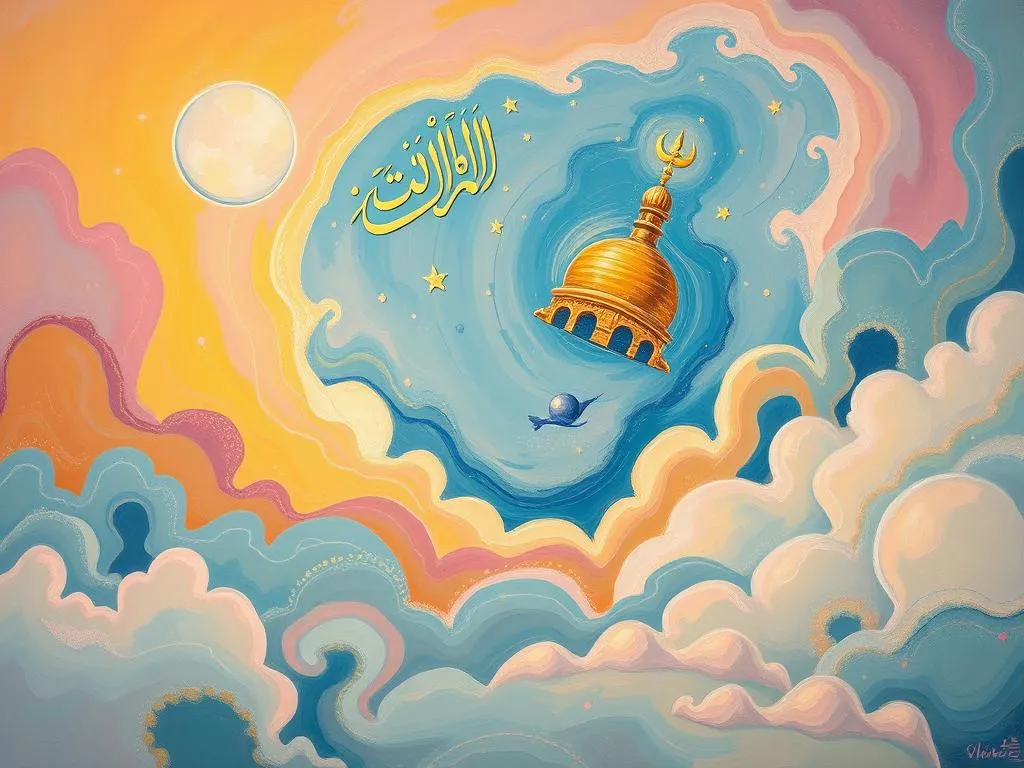
Dreams have long fascinated humanity, serving as a bridge between our conscious thoughts and the mysterious realm of the subconscious. In the context of Islam, dreams hold a significant place, often regarded as a form of divine communication or a reflection of one’s spiritual state. The exploration of dream symbolism within Islamic traditions not only intrigues individuals seeking deeper meaning but also encourages self-reflection and personal growth. This article aims to delve into the rich tapestry of dream symbolism in Islam, examining common symbols, key scenarios, and their connections to everyday life.
Symbolism and Meaning
In Islamic dream interpretation, symbols play a crucial role in conveying messages from the subconscious or even from a spiritual plane. Common symbols found in dreams can vary significantly in meaning, influenced by cultural context, personal experiences, and religious beliefs. For instance, the presence of water in a dream often symbolizes purity and spirituality. Clear, flowing water might represent divine guidance, while murky water could indicate feelings of confusion or distress.
Another widely recognized symbol is that of light. In Islamic teachings, light is often associated with knowledge, truth, and guidance. A dream featuring bright light can signify enlightenment or a newfound understanding of a situation, while darkness may reflect ignorance or a lack of clarity.
Animals also frequently appear in dreams, and their interpretations can vary widely. For instance, dreaming of a snake can evoke feelings of fear or betrayal, as snakes are often linked to deceit and hidden dangers. Conversely, a bird might symbolize freedom, transcendence, or the spirit’s longing for a greater connection with the divine.
In Islamic tradition, prophetic dreams—those perceived to carry messages from Allah—are particularly significant. These dreams often provide guidance or warnings and are regarded as sacred. Interpreting such dreams involves a deep understanding of one’s personal context and the broader spiritual implications.
Key Scenarios and Variations
The interpretation of dreams can shift dramatically based on the specific scenarios presented. For example, a dream involving prayer can carry different meanings depending on the context. If one dreams of performing prayers in a mosque, it may symbolize a strong connection to faith and community. However, dreaming about forgetting to pray could indicate feelings of guilt or spiritual disconnection.
Another common scenario is the dream of travel. In Islamic symbolism, travel often represents a journey of self-discovery or spiritual exploration. A dreamer embarking on a pilgrimage could reflect a desire for deeper religious understanding or a quest for inner peace. Conversely, feeling lost during travel might highlight feelings of uncertainty or a need for direction in life.
Dreams involving family members can also vary widely in interpretation. If a loved one appears in a supportive role, it may symbolize familial love and unity. However, a dream that features conflict with family members might reflect unresolved issues or emotional turmoil that needs to be addressed.
Additionally, the cultural context plays a significant role in shaping the interpretation of dreams. For instance, in some cultures, dreaming of a specific color might hold particular significance. In Islam, the color green is often associated with paradise and represents hope and renewal, while red may symbolize warning or danger.
Real-Life Connections and Takeaways
Understanding the symbolism and scenarios of dreams can be a powerful tool for personal growth and self-reflection. Readers are encouraged to consider their own dreams within the context of their daily lives. Reflecting on the emotions and situations present in dreams can reveal underlying feelings or unresolved issues. For instance, if a dream evokes fear or anxiety, it might be helpful to explore what aspects of waking life are causing similar emotions.
Keeping a dream journal can facilitate this process. By writing down dreams as soon as you wake up, you create a valuable record that can be revisited later for patterns and themes. Over time, this practice can enhance self-awareness and provide clarity on personal challenges or spiritual questions.
It’s also beneficial to approach dreams with an open mind, acknowledging that interpretations can be subjective. Engaging in conversations with others about their dreams can offer new perspectives and insights. Joining a community or group focused on dream interpretation can foster discussions that enhance understanding and personal growth.
Moreover, integrating spiritual practices such as prayer or meditation before sleep can create a conducive environment for meaningful dreams. Many individuals find that seeking divine guidance through these practices enhances their dream experiences, leading to revelations or clarity in their waking lives.
In conclusion, the exploration of dream symbolism within Islam opens a gateway to a deeper understanding of oneself and the spiritual world. By reflecting on the symbols, scenarios, and personal connections found in dreams, individuals can embark on a journey of self-discovery and growth. Dreams are not merely fleeting images but a canvas upon which we can paint our fears, hopes, and aspirations, ultimately leading us closer to our true selves and our relationship with the divine.







